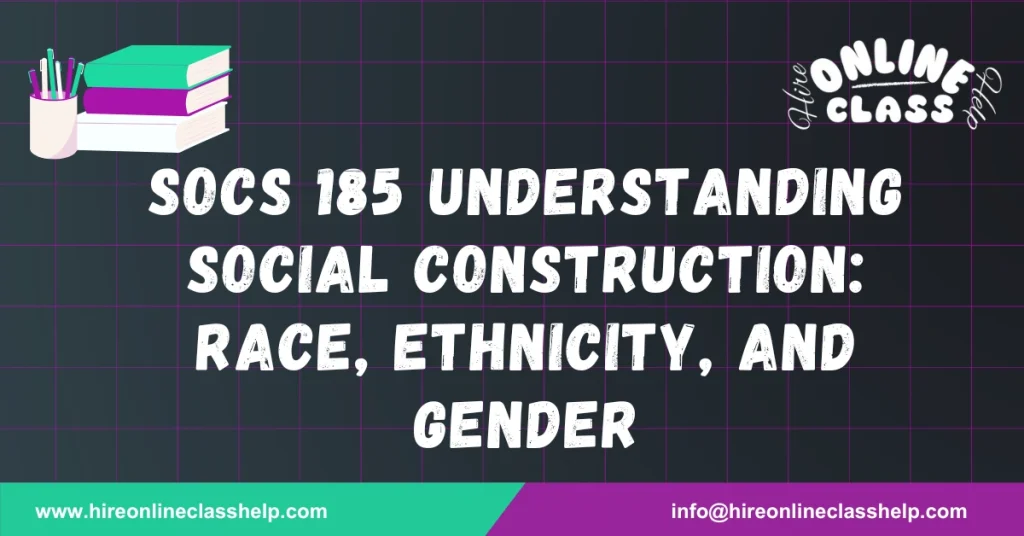






Name
Chamberlain University
SOCS-185 Culture & Society
Prof. Name
Date
Social construction is a concept that investigates how people in society create and accept shared understandings of the world through their interactions. It covers a wide array of social phenomena, including race, ethnicity, and gender. These social constructions are critical in shaping human perspectives and interactions, as they help define and categorize societal norms. This article focuses on the social construction of race, ethnicity, and gender, emphasizing their significance in shaping our perception of the world.
The social construction of race refers to the process by which societies assign meaning to physical differences between people. Rather than being a biological fact, race is understood as a social perception. This perception often changes across different groups and cultures, showing that racial categorization is subjective. While race is often thought to be grounded in physical attributes, it is actually constructed through social interaction. This understanding highlights the fact that genes common to a particular group do not determine their social identity. Moreover, racial categorizations differ between regions, further underscoring the fluid and non-biological nature of race.
Ethnicity, in contrast to race, focuses on shared culture, language, beliefs, and practices that define a group. Unlike race, which is primarily concerned with physical characteristics, ethnicity is based on cultural affiliations and identities. Ethnicity encompasses traditions, values, customs, and shared historical experiences that create a collective cultural heritage for a group. These distinctions are socially constructed and change across time and place, much like the social understanding of race.
The social construction of gender is concerned with how society creates norms and expectations about gender roles. These roles are shaped by cultural values and societal views regarding behavior and attributes deemed appropriate for individuals based on their perceived gender. Gender roles are often reinforced by stereotypes, which perpetuate the idea that men and women possess distinct qualities and behaviors. However, it is critical to recognize that gender is not limited to a binary understanding of male and female; it includes a spectrum of identities that challenge traditional notions of gender.
Race, ethnicity, and gender all represent social constructions that revolve around categorizing individual differences. Race focuses on physical distinctions, ethnicity emphasizes cultural identities, and gender is rooted in societal expectations and roles. These constructs influence how individuals perceive themselves and others, shaping their social experiences and opportunities. The subjective nature of these categories highlights the importance of understanding them as social constructs rather than inherent qualities.
Understanding social construction offers valuable insights into how societal categories shape our reality and perceptions. Recognizing race, ethnicity, and gender as social constructs encourages critical thinking and challenges essentialist views that ascribe inherent qualities to individuals based on these categories. This awareness fosters empathy, inclusivity, and respect for diverse identities and experiences. By accepting the socially constructed nature of these categories, society can become more inclusive, embracing diversity and promoting equality.
The social construction of race, ethnicity, and gender demonstrates the significant role that society plays in shaping our understanding of these categories. Race is not biologically determined but is socially assigned, ethnicity revolves around shared cultural practices, and gender roles are socially constructed. By recognizing the social nature of these constructs, we can challenge societal norms, question stereotypes, and work toward a more inclusive and equitable world. Embracing the concept of social construction empowers individuals to think critically about societal categorizations and promote a more understanding and diverse society.
Leeds-Hurwitz, W. (2016, June 28). Social Construction. Oxford Bibliographies. https://www.oxfordbibliographies.com/view/document/obo-9780199756841/obo-9780199756841-0106.xml.
Kendall, D. (2018). Sociology in our times: The essentials (11th ed.). Cengage Learning.
| Aspect | Race | Ethnicity | Gender |
|---|---|---|---|
| Definition | Physical differences assigned social meaning | Shared culture, beliefs, language, and practices | Societal norms and expectations regarding roles |
| Key Features | Based on social perceptions, not biology | Focused on cultural identities and affiliations | Encompasses stereotypes and societal expectations |
| Comparison | Categorizes by physical distinctions | Emphasizes cultural heritage and traditions | Related to behavior, roles, and identity spectrum |
| Construction Process | Varies across cultures and regions | Built on shared history and cultural practices | Developed through societal values and norms |
| Examples | Varying racial categorizations in different countries | Ethnic group affiliations like language and customs | Gender roles, expectations, and non-binary identities |
| . |